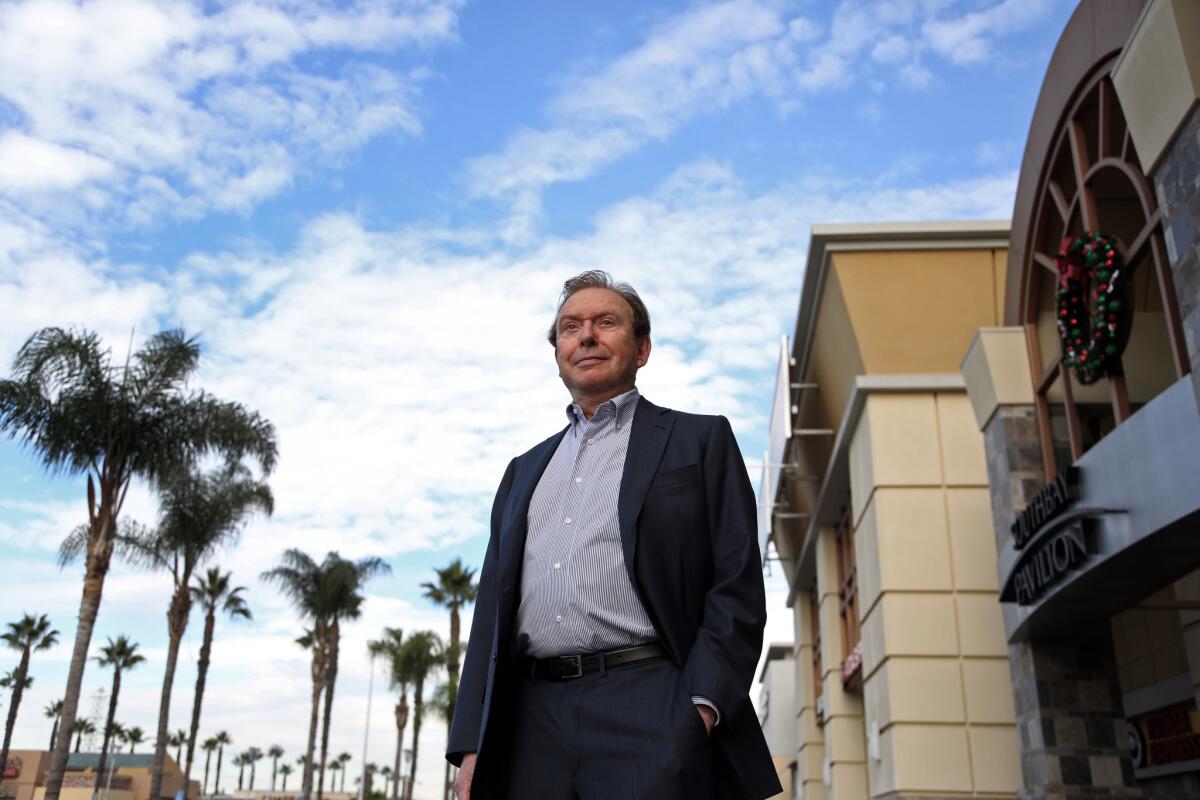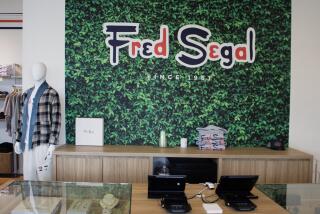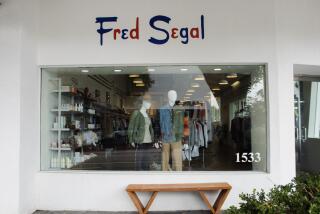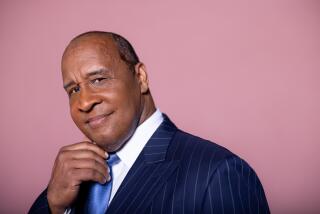Fred Sands, once the king of high-end L.A. real estate, dies at 77

Fred Sands outside the SouthBay Pavilion Mall, one of the many shopping centers he acquired.
- Share via
The Fred Sands name once adorned for-sale signs throughout Los Angeles’ most affluent neighborhoods, turning the real estate broker into a star in a land full of them.
In the early 1980s, a then-upstart agent recalls being summoned to Sands’ Brentwood office, parking behind the mogul’s Rolls-Royce and making his way to the penthouse where Sands managed his real estate empire.
“It was like meeting the Wizard of Oz,” recalled Mike Glickman, who himself become a major player in Southland real estate. “He was bigger than life.”
On Friday, the man behind all those real estate signs died of a stroke while in Boston, a family spokeswoman said. He was 77.
The son of a New York cab driver, Sands built what would become the largest independent residential real estate brokerage in California with 65 offices, before he shifted his focus to turning around distressed shopping centers.
Sands, who was active in the L.A. arts scene and became a noted arts collector, was a pioneer in real estate marketing, licensing his name to other brokerages and heavily promoting his agents with ads, said Betty Graham, former president of Coldwell Banker’s greater Los Angeles region.
“He was such a visionary,” said Graham, who described herself as a former “friendly competitor” of Sands.
He was known to be blunt when sizing up real estate. In 1989, before a housing crash, he wrote a letter to clients and warned them that the market was in trouble, advising that if they were debating selling their homes, they should do so, and fast.
“He was the real estate leader of Los Angeles,” said Glickman, who at one point worked for Sands after his own brokerage went bankrupt in 1990. “His quotes and his ideas could move real estate.”
By the end of the century, Sands’ brokerage and its franchises generated roughly $9.5 billion in sales and employed 4,000.
When he sold Fred Sands Realtors to Coldwell Banker in 2000 for more than $100 million, Sands seemed to disappear from the public landscape — likely a welcome consequence for a man who once told a reporter he had grown tired of the attention.
“I was overexposed,” Sands told the Los Angeles Business Journal in 2009. “Guys would look at me funny when I’d see them in social situations. I got fed up with it.”
Instead of retiring, however, he continued in real estate, choosing a less high-profile market than homes in real estate-crazed Southern California.
After seeing money to be made in rebuilding and rebranding ailing shopping centers, Sands began to acquire distressed malls through an arm of Vintage Capital Group, which he headed. The firm also invested in mid-size companies that appeared poised to grow.
His philosophy on turning around a flat-lining shopping center seemed both simple and sensible — make malls more of a social experience.
“We put in music, put in benches, and automatically people stayed,” Sands said of a turnaround project in Albuquerque. “The population is getting older and they want to sit down. When they get hungry, they want something to eat.”
Sands told The Times he never contemplated calling it quits.
“I’ve had friends retire,” he said in 2013, “and nobody wants to go to lunch with them.”
A noted supporter of the arts, Sands was a founder of the Museum of Contemporary Arts and served on the board of the Los Angeles Opera. He was appointed to the President’s Advisory Committee on the Arts by President George W. Bush and served on the California Arts Council.
Born in New York City on Feb. 16, 1938, Sands moved with his family to Boyle Heights when he was 7. He went on to attend UCLA before plunging into real estate. He got his start flipping homes, but during a 1960s downturn decided to become a real estate agent because he thought it would be more lucrative.
After a short time with Coldwell Banker, he founded his own brokerage in 1969 — a decision that would make Sands a household name across the Southland.
Sands is survived by his wife, Carla; son, Jonathan; daughter, Alexandra; and a brother, William.
andrew.khouri@latimes.com
Times staff writer Steve Marble contributed to this report.
ALSO
Fair offers students of color a better shot at prep school dreams
Mayor’s return to church where protesters disrupted him is scuttled
In face of criticism, S.F. supervisor reaffirms city’s sanctuary policies
More to Read
Start your day right
Sign up for Essential California for the L.A. Times biggest news, features and recommendations in your inbox six days a week.
You may occasionally receive promotional content from the Los Angeles Times.







